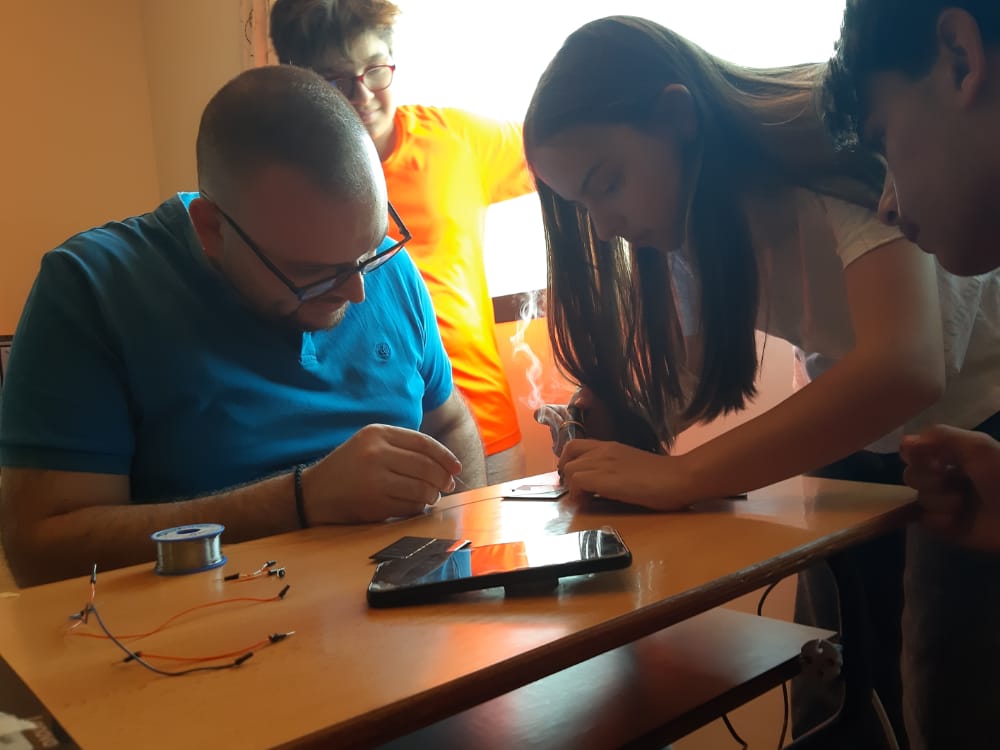Project Context
Situated in Rahbe, Akkar, Ecole Nationale Orthodoxe-Rahbe accommodates 455 students. The school places great importance on wellbeing and emphasizes the rights and responsibilities of students in social development. Their educational approach centers around applying knowledge and sciences to nurture talent and foster positive change within the country and society.
In light of the electricity and climate crises in Lebanon, the school proactively aimed to achieve two primary objectives: reduce non-renewable energy consumption while promoting understanding of renewable energy by assisting students in developing innovative solutions through practical models, and ultimately decrease non-renewable energy consumption. Additionally, the school team aimed to equip students with essential twenty-first-century skills such as critical thinking, problem-solving, communication, collaboration, and more.
Project Description
At first, a STEAM Lab was renovated and equipped with materials and laptops to become ready for students and teachers to develop their digital and technological skills, as well as design and model environmental and friendly solutions.
Then, during the 100-day challenge, a group of 40 students, from grades seven till 12 were joined by a group of 10 students from the community and attended renewable energy and Arduino trainings. During the Arduino training, the open-source electronics platform was designed to help them find and model the implementation of solutions. There, the students learned about the basics of renewable energy and how it can be sourced, as well as coding.
Through their research, they have identified the key issues they wanted to target and, with the help of their English teacher, wrote research papers about their projects describing the entire process. Then they created an informatics laboratory that converts scientific knowledge into digital information, easily accessible to all students.
One of the solutions that the students came up with was an energy-generating speed bump that lights the street at night to avoid accidents and to ensure road safety.
Another solution the students developed and created a model for was a sensor that evaluates the moisture of the soil. Once detected that the plants need water, water sprinklers are automatically turned on ensuring that the crops are receiving proper care.
Beyond the incredible ideas that the students came up with as solutions, everyone was inspired by their team spirit, their leadership skills and how they took responsibility for work with full ownership. Their sense of citizenship during the project has been modeled in their community involvement, team collaborations, and role distribution, in addition to the rules governing the shared space.
The acquisition of skills was evaluated through a rubric table, interviews, and focus groups.
The number of students who are registered in this lab has increased. More teachers are involved in the project, where STEAM is now integrated within other subjects, such as the music subject, allowing students to build instruments using recyclables and Arduino.
Thus, an internal scaling took place to different grades and subjects and the students’ creativity has spread throughout their curriculum.

Achievements to Date
- 200 students’ scientific, practical, technological, and autonomy capabilities developed by 70% by applying project-based learning, reinforcing green sustainability.
- The students scored an average of 87% on their projects, based on problem solving, effective use of renewable energy, electric installations, coding, and communication skills rubric.
- Through their eco-friendly and entrepreneurial spirit, the students have created eight innovative solution models, with several more currently in progress.
The Human Heartbeat
Driven by the remarkable achievements of the project, the school community eagerly embraces the opportunity to extend their welcoming embrace to other schools and community members, allowing them to reap the benefits of their newly established space. The teachers are also committed to sharing their recently acquired skills with others, amplifying the impact even further.
Many students have expressed an increased confidence and pride of belonging to this school, where they were given trust and access to the lab.
